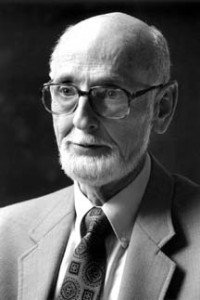When I was a girl, I dreamed of becoming a nurse and working with Dr. Albert Schweitzer to relieve human suffering and sickness in the clinic he founded in the jungles of Lambaréné, French Equatorial Africa. I did become a nurse, but I never got to work with Dr. Schweitzer. I did, however, get to work with Dr. Jacob Kay.
In 1979, Dr. Kay founded the Seton Regional Neonatal Center in Austin. In 1974, he left a practice at Parkland Hospital and a faculty position at Southwestern Medical School in Dallas to develop a program at the Seton Family of Hospitals to care for sick and premature newborns of Austin and the Central Texas 10-county region.
During five years of meticulous planning, Dr. Kay maintained a tireless attention to detail and an uncompromising insistence on high quality. He also sharpened negotiating skills which later would prove important in advocating for children’s health. The center he founded not only provided specialty care for the sickest newborns, but also provided regional education and transportation. His perseverance resulted in a comfortable and conceptually solid neonatal unit that would both withstand and flex with the ever-changing healthcare landscape.
 In 1980, I joined the neonatal team as an inexperienced and at times intimidated nurse. I remember how scared I was the first time I had to call him arterial blood gas results on a very sick infant. Sure enough, after telling him the pH, the pO2, and the pCO2, he asked me what the base excess was. Burn! But Dr. Kay had faith in me and unofficially precepted me both in neonatal and a decade later with my graduate studies in health policy.
In 1980, I joined the neonatal team as an inexperienced and at times intimidated nurse. I remember how scared I was the first time I had to call him arterial blood gas results on a very sick infant. Sure enough, after telling him the pH, the pO2, and the pCO2, he asked me what the base excess was. Burn! But Dr. Kay had faith in me and unofficially precepted me both in neonatal and a decade later with my graduate studies in health policy.
In medical school, I think Dr. Kay must have slept through the history lecture about how medicine branched off from public health in the early 1900s. His caring and holistic approach to practice reflected his belief that medicine and public health are inextricably linked. He always saw the infant’s condition from within its social, economic, and environmental context, as exemplified in an excerpt from his retirement speech, “…the 1970s witnessed… significant improvements in maternal, fetal and newborn health outcomes…. [T]he perinatal knowledge base was expanding, and newer technologies were being introduced, but the perinatal healthcare change of the 1970s and the early ’80s was primarily driven by a new national consensus that maternal and neonatal deaths could be reduced by planned, coordinated health services for all mothers and babies.”
He worked tirelessly with nursing (Sheila Quinn and Lesley Watson) and social service (Mary Ellen Ott) to assure that all the families’ needs were met, not just while in hospital but after the infants went home. Professional boundaries (and turf) faded and disappeared as we all worked together, as one, to meet the needs of the infants and their families.
Like Dr. Schweitzer, he maintained a meticulous pursuit of perfection, and preferred to be at the bedside of those who needed him. And like Dr. Schweitzer, Dr. Kay always maintained humility, dignity, and humor. Dr. Kay’s love and caring know no bounds, and many hundreds of Texas children who might have died are here to prove it, leading happy, healthy, and fulfilling lives.
Illness in 1983 took Dr. Kay away from his beloved patient care. At that point, he directed his efforts at influencing health policy to benefit the children of Texas, especially those with special needs. Again, Dr. Kay worked tirelessly as chair and member of numerous perinatal ad hoc and legislative committees, coalitions, and commissions. He retired in Austin March 31, 1993, after 19 years of dedicated service to Central Texas children and their families.
Those years working as a nurse with Dr. Kay were always gratifying and inspirational. I often reflected that it wouldn’t be much different if I were working in Lambaréné with Dr. Schweitzer. Thank you, Dr. Kay, for all your years of dedicated service, and thank you for making my dreams come true.
[Epilogue: Dr. Jacob Kay died Aug. 16, 2002, at age 74.]

 Austin, Texas
Austin, Texas